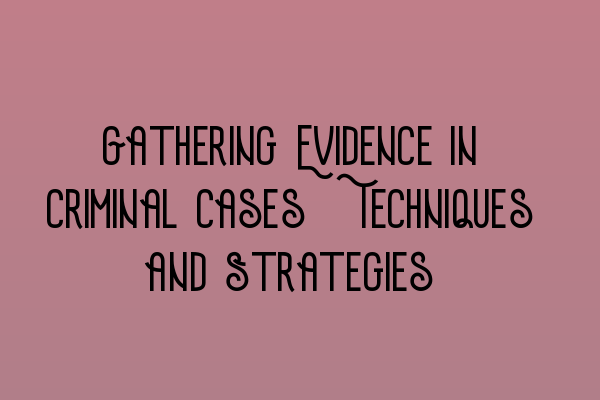Gathering Evidence in Criminal Cases: Techniques and Strategies
When it comes to criminal cases, gathering evidence is a critical aspect of building a strong defense. As a solicitor at SQE Criminal Law & Practice Law UK, I have witnessed firsthand the importance of employing effective techniques and strategies to ensure the best possible outcome for our clients.
The Significance of Gathering Evidence
Effective evidence gathering can make or break a criminal case. It forms the backbone of a legal argument and allows the defense to challenge the prosecution’s claims or present alternative explanations. Without sufficient evidence, the defense may struggle to create a reasonable doubt in the minds of the jury or judge.
At SQE Criminal Law & Practice Law UK, we understand the gravity of evidence collection and work diligently to gather, analyze, and present compelling evidence on behalf of our clients. Let’s explore some of the techniques and strategies we employ:
1. Thorough Investigation
A comprehensive investigation is the foundation of effective evidence gathering. Our experienced team of solicitors dives deep into the case, examining every possible angle and gathering information from various sources.
Read our article on SQE 1 Practice Exam Questions to further understand the importance of thorough investigation.
2. Interviews and Witness Statements
Interviewing witnesses and obtaining their statements is a crucial step in building a strong defense. Our solicitors are skilled in conducting interviews, extracting pertinent information, and capturing witness statements to support our clients’ positions.
To prepare for interviews, it’s essential to familiarize oneself with effective communication techniques. Check out our comprehensive guide on SQE 1 Practice Mocks FLK1 FLK2 for valuable insights.
3. Forensic Analysis
Forensic analysis plays a vital role in criminal cases, helping to uncover valuable evidence that may have gone unnoticed. At SQE Criminal Law & Practice Law UK, we collaborate with expert forensic analysts to analyze DNA, fingerprints, digital evidence, and more.
For further information on forensic analysis techniques, refer to our article on SQE 2 Preparation Courses for a deeper understanding.
4. Surveillance and Monitoring
In some cases, surveillance and monitoring can be instrumental in gathering evidence. Our legal team understands the techniques involved in conducting surveillance lawfully and effectively, adhering to ethical boundaries.
Curious about preparing for SQE exams? Check out our article on SQE 1 Preparation Courses to get started on your journey.
5. Collaborating with Expert Witnesses
Expert witnesses can provide valuable insight and testimony based on their specialized knowledge. We collaborate with a network of trusted experts who can contribute their expertise to support our clients’ defense.
Stay updated on the latest SRA SQE exam dates by visiting our article on SRA SQE Exam Dates.
Conclusion
Gathering evidence in criminal cases requires a multifaceted approach, employing various techniques and strategies to build a solid defense. At SQE Criminal Law & Practice Law UK, we understand the importance of thorough investigation, witness statements, forensic analysis, surveillance, and collaborating with expert witnesses. By employing these strategies, we strive to provide our clients with the best possible outcome.
For further assistance or to explore our legal services, feel free to contact us at SQE Criminal Law & Practice Law UK. We are here to advocate for you.
